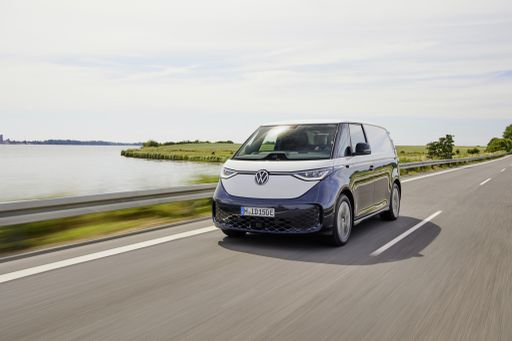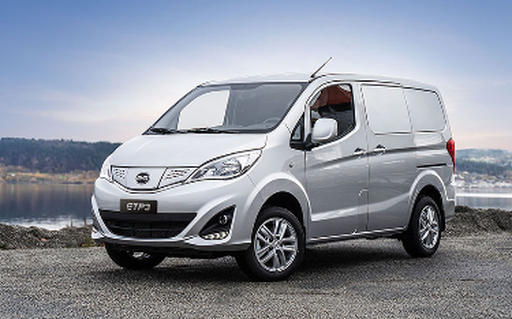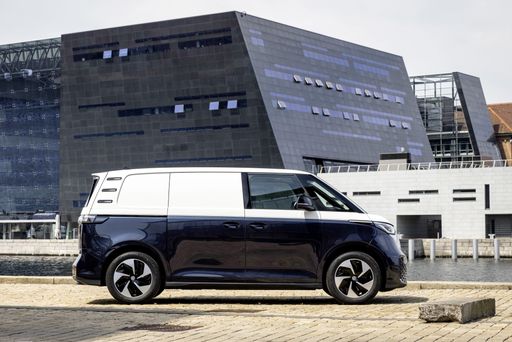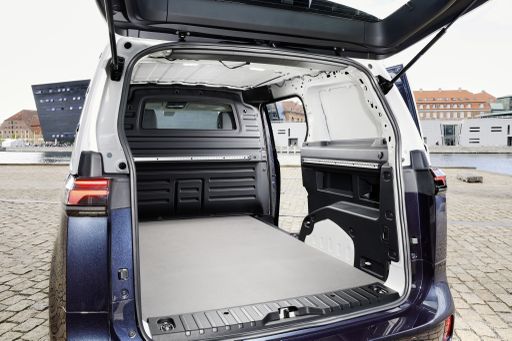BYD ETP3 vs VW ID. Buzz Cargo - Differences and prices compared
Compare performance (136 HP vs 340 HP), boot space and price (31600 £ vs 43600 £ ) at a glance. Find out which car is the better choice for you – BYD ETP3 or VW ID. Buzz Cargo?
Costs and Efficiency:
Price and efficiency are key factors when choosing a car – and this is often where the real differences emerge.
BYD ETP3 has a evident advantage in terms of price – it starts at 31600 £ , while the VW ID. Buzz Cargo costs 43600 £ . That’s a price difference of around 11944 £.
As for electric range, the VW ID. Buzz Cargo performs significantly better – achieving up to 455 km, about 222 km more than the BYD ETP3.
Engine and Performance:
Power, torque and acceleration are the classic benchmarks for car enthusiasts – and here, some clear differences start to show.
When it comes to engine power, the VW ID. Buzz Cargo has a convincingly edge – offering 340 HP compared to 136 HP. That’s roughly 204 HP more horsepower.
In terms of top speed, the VW ID. Buzz Cargo performs noticeable better – reaching 160 km/h, while the BYD ETP3 tops out at 100 km/h. The difference is around 60 km/h.
There’s also a difference in torque: VW ID. Buzz Cargo pulls decisively stronger with 679 Nm compared to 180 Nm. That’s about 499 Nm difference.
Space and Everyday Use:
Whether family car or daily driver – which one offers more room, flexibility and comfort?
Seats: VW ID. Buzz Cargo offers distinct more seating capacity – 3 vs 2.
In curb weight, BYD ETP3 is clearly perceptible lighter – 1640 kg compared to 2264 kg. The difference is around 624 kg.
In maximum load capacity, the VW ID. Buzz Cargo performs somewhat better – up to 3900 L, which is about 400 L more than the BYD ETP3.
When it comes to payload, BYD ETP3 slight takes the win – 780 kg compared to 753 kg. That’s a difference of about 27 kg.
Who wins the race in the data check?
The VW ID. Buzz Cargo sits well ahead of its rival in the objective data comparison.
This result only shows which model scores more points on paper – not which of the two cars feels right for you.
Costs and Consumption
View detailed analysis
Engine and Performance
View detailed analysis
Dimensions and Body
View detailed analysis

VW ID. Buzz Cargo
BYD ETP3
The BYD ETP3 is a smart, no-nonsense electric offering that blends everyday practicality with a quietly modern design that won’t embarrass you in the supermarket car park. It’s ideal for buyers after fuss-free electric mobility — efficient, clever and just playful enough to make city driving a little more fun.
details
VW ID. Buzz Cargo
The VW ID. Buzz Cargo marries retro Volkswagen charm with a thoroughly modern electric work van, offering a surprisingly spacious and practical load area wrapped in friendly, iconic styling. It's a smart pick for urban tradespeople and small businesses who want quiet, effortless driving, lower running costs and easy maneuverability — with a healthy dash of nostalgia on the job.
details


Costs and Consumption |
|
|---|---|
|
Price
31600 £
|
Price
43600 - 51400 £
|
|
Consumption L/100km
-
|
Consumption L/100km
-
|
|
Consumption kWh/100km
-
|
Consumption kWh/100km
19.2 - 20.3 kWh
|
|
Electric Range
233 km
|
Electric Range
330 - 455 km
|
|
Battery Capacity
-
|
Battery Capacity
59 - 79 kWh
|
|
co2
0 g/km
|
co2
0 g/km
|
|
Fuel tank capacity
-
|
Fuel tank capacity
-
|
Dimensions and Body |
|
|---|---|
|
Body Type
Cargo Van
|
Body Type
Cargo Van
|
|
Seats
2
|
Seats
3
|
|
Doors
5
|
Doors
4
|
|
Curb weight
1640 kg
|
Curb weight
2264 - 2510 kg
|
|
Trunk capacity
-
|
Trunk capacity
-
|
|
Length
4460 mm
|
Length
4712 mm
|
|
Width
1720 mm
|
Width
1985 mm
|
|
Height
1875 mm
|
Height
1932 mm
|
|
Max trunk capacity
3500 L
|
Max trunk capacity
3900 L
|
|
Payload
780 kg
|
Payload
640 - 753 kg
|
Engine and Performance |
|
|---|---|
|
Engine Type
Electric
|
Engine Type
Electric
|
|
Transmission
Automatic
|
Transmission
Automatic
|
|
Transmission Detail
-
|
Transmission Detail
-
|
|
Drive Type
Rear-Wheel Drive
|
Drive Type
Rear-Wheel Drive, All-Wheel Drive
|
|
Power HP
136 HP
|
Power HP
170 - 340 HP
|
|
Acceleration 0-100km/h
-
|
Acceleration 0-100km/h
-
|
|
Max Speed
100 km/h
|
Max Speed
145 - 160 km/h
|
|
Torque
180 Nm
|
Torque
310 - 679 Nm
|
|
Number of Cylinders
-
|
Number of Cylinders
-
|
|
Power kW
100 kW
|
Power kW
125 - 250 kW
|
|
Engine capacity
-
|
Engine capacity
-
|
General |
|
|---|---|
|
Model Year
2023
|
Model Year
2024
|
|
CO2 Efficiency Class
A
|
CO2 Efficiency Class
A
|
|
Brand
BYD
|
Brand
VW
|
What drive types are available for the BYD ETP3?
The BYD ETP3 is offered with Rear-Wheel Drive.
